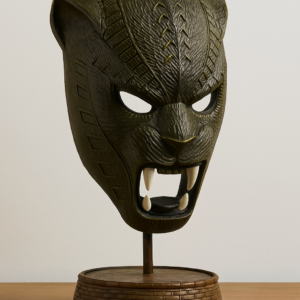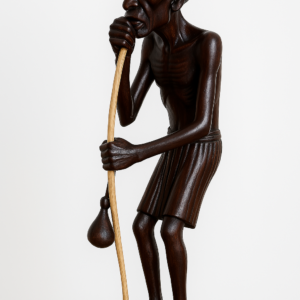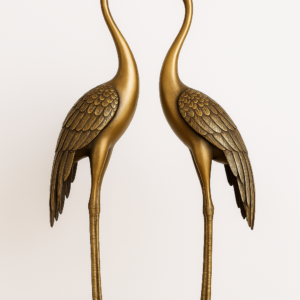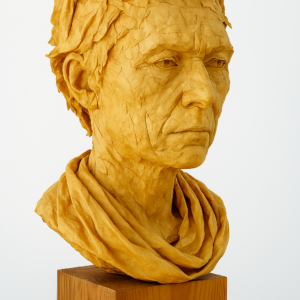“Ngurumo Ya Joka,” meaning “The Roar of the Great Ape” in Swahili, is a monumental artistic expression of primal force, royal defiance, and ancestral might—echoing the powerful legacy of the Jabari Tribe of Wakanda. This ceremonial mask captures the raw ferocity and sacred strength of the gorilla totem, a symbol deeply revered across African cultures and modern Afrofuturist mythology alike.
Inspired by the cinematic and spiritual presence of M’Baku—the great warrior chief of the Jabari—this sculptural mask is a fusion of traditional African gorilla iconography and the pan-African vision of Wakanda’s mountain clans. It speaks not only of strength but of stoic protection, independence, and spiritual resilience. This is not merely a decorative object; it is a declaration of heritage, power, and identity.
The mask is carved in the roaring visage of a gorilla deity. Its mouth gapes open in a frozen, eternal bellow—a war cry that silences doubt and summons ancestral presence. Each tooth, individually sculpted, protrudes with purpose, some worn, some cracked, suggesting not just savagery but endurance through battle. The open mouth is more than aggressive posturing—it is a portal of voice, channeling sacred utterances from the ancestral plane.
Its eyes are deep hollows, intentionally left shadowed to evoke mystery and spiritual depth. When worn or lit from specific angles, these eye sockets appear to glow from within, embodying the gaze of a protector who sees beyond the veil of the material world. The nose is broad, the cheek structure powerful, mimicking the biological and spiritual might of the mountain gorilla.
But the most defining element of Ngurumo Ya Joka is the etched tribal patterning across the forehead and crown. These geometric inscriptions—sharp diamonds, converging arrows, and interlocking chevrons—are ancient motifs of power, direction, and protection. Such markings were historically carved into sacred masks to guide energy flow, represent warrior status, or signify alignment with particular animal spirits. On this mask, they appear like a coded script from a lost kingdom—both decorative and symbolic, like the ancestral blueprints of a hidden nation.
The craftsmanship is extraordinary. Made from high-density resin composite for durability, it mimics the texture of hand-carved ebony or iroko wood. The surface is slightly weathered, with a burnished patina that captures light and emphasizes the contours of every muscle, every etched scar. The coloration is a balance of dark earth brown and aged bone, highlighting both the humanity and the beastliness of the mask.
Mounted on a round, wooden pedestal base with a slender rod, the mask stands tall and commanding on any surface—be it a collector’s studio, private altar, gallery pedestal, or cultural center. The base is textured like a woven mat, subtly referencing African craftsmanship and the sacred grounding of ritual objects.
The gorilla, in African lore, is often associated with guardianship of sacred places, wisdom that speaks only when necessary, and brute force restrained by immense discipline. In Wakandan interpretation, the gorilla represents the Jabari tribe’s rejection of foreign influence, their commitment to tradition, and their claim to sovereignty through ancestral law, not technological supremacy. Ngurumo Ya Joka embodies this narrative. It is the mask of the one who walks alone but holds the mountain in his palm.
For collectors of African or Afrofuturist art, this piece is a cornerstone. It bridges ancient spirituality with modern legend. For fans of the Black Panther universe, it is a powerful homage to a lesser-known yet equally mighty tribe—those who speak through the roar of justice rather than diplomacy.
Its sculptural quality, thematic potency, and cultural roots make it a unique piece for both seasoned collectors and new admirers of Wakandan-inspired art. It is ideal for interior spaces that thrive on meaning—spaces that tell stories, that honor ancestors, that invite conversations about power, identity, and the future of African aesthetic expression.






Reviews
There are no reviews yet.